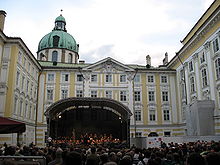- Music of Austria
-
Vienna has been an important center of musical innovation. 18th and 19th century composers were drawn to the city due to the patronage of the Habsburgs, and made Vienna the European capital of classical music. Wolfgang Amadeus Mozart, Ludwig van Beethoven and Johann Strauss II, among others, were associated with the city. During the Baroque period, Slavic and Hungarian folk forms influenced Austrian music. Vienna's status began its rise as a cultural center in the early 16th century, and was focused around instruments including the lute.
Contents
Yodel
Yodeling, a form of singing that involves rapid and repeated changes of register, was developed in the Alps. In Austria, it was called juchzn.
Schrammelmusik
The most popular form of modern Austrian folk music is Viennese schrammelmusik, which is played with an accordion and a double-necked guitar. Modern performers include Roland Neuwirth, Karl Hodina and Edi Reiser.
Schrammelmusik arose as a mixture of rural Austrian, Hungarian, Slovenian, Moravian and Bavarian immigrants crowded the slums of Vienna. At the time, waltzes and ländlers mixed with the music of the immigrants absorbing sounds from all over central and eastern Europe and the Balkans. The name Schrammelmusik comes from two of the most popular and influential performers in Schrammelmusik's history, brothers Johann and Josef Schrammel. The Schrammels formed a trio called along with bass guitarist Anton Strohmayer and helped bring the music to the middle- and upper-class Viennese, as well as people from surrounding areas. With the addition of a clarinetist, George Dänzer, they formed the Schrammel-Quartett, and Schrammelmusik's form settled on a quartet.
Neuwirth is a younger performer who has incorporated foreign influences, most especially the blues, to some criticism from purists.
Alpine punk
Alpunk (Alpine punk) is a genre of punk rock from the Alpine regions of Germany, Switzerland and Austria. Alpunk fuses the chaotic, energetic rhythms of punk music to the accordion-based folk music for which the region is famous.
Rock and pop music
Falco was the most popular Austrian solo artist throughout the 1980s. His songs "Rock Me Amadeus" and "Der Kommissar" were big international hits with "Rock Me Amadeus" reaching the Billboard Hot 100 in 1986. His sudden death in 1998 in the Dominican Republic catapulted his music from the 1980s once again into the spotlight.
Although Austria is not exactly the biggest exporter of international rock and pop-bands, there are a few notable musicians and bands.
Opus also made it in the charts worldwide as well,. In the last few years, several music groups toured Europe and had commercial success in the international charts. The most prominent being Christina Stürmer, who is successful in Germany, Austria and Switzerland. SheSays, who supported Bryan Adams on his European tour and some other bands like AOR, and Cornerstone, are notable for their recent contributions.
Blackened death metal trio Belphegor currently leads the Austrian metal scene, which also includes Hollenthon, Pungent Stench, Abigor, Disharmonic Orchestra, Visions of Atlantis, Dornenreich, Summoning and Estatic Fear.
Drummer Thomas Lang was born in Vienna in 1967 and is now world renowned for his technical abilities, having played with artists such as Robert Fripp, Geri Halliwell and Robbie Williams.
Current music
The Vienna Philharmonic is a world-renowned classical music ensemble and tours throughout the year all over the world. Their New Year's Day concert held in Vienna every year in the Musikverein is one of Europe's most important classical concerts during the year.
Stahlhammer, Christina Stürmer, and L'Âme Immortelle are three of the most popular Austrian acts.
See also
- Austrian folk dancing
- Music of Vienna
- Music of Innsbruck
- Ländler
External links
- (French) Audio clip: traditional Austrian music. Musée d'Ethnographie de Genève. Accessed November 25, 2010.
- Schrammel-Quartett (from www.aeiou.at)
- Austria information - Includes Austrian music, culture and food
- Dancing with the Stars Austria
References
- Wagner, Christopher. "The Alpunk Phenomenon". 2000. In Broughton, Simon and Ellingham, Mark with McConnachie, James and Duane, Orla (Ed.), World Music, Vol. 1: Africa, Europe and the Middle East, pp 7–12. Rough Guides Ltd, Penguin Books. ISBN 1-85828-636-0
- Wagner, Christopher. "Soul Music of Old Vienna". 2000. In Broughton, Simon and Ellingham, Mark with McConnachie, James and Duane, Orla (Ed.), World Music, Vol. 1: Africa, Europe and the Middle East, pp 13–15. Rough Guides Ltd, Penguin Books. ISBN 1-85828-636-0
Music of Europe Sovereign
states- Albania
- Andorra
- Armenia
- Austria
- Azerbaijan
- Belarus
- Belgium
- Bosnia and Herzegovina
- Bulgaria
- Croatia
- Cyprus
- Czech Republic
- Denmark
- Estonia
- Finland
- France
- Georgia
- Germany
- Greece
- Hungary
- Iceland
- Ireland
- Italy
- Kazakhstan
- Latvia
- Liechtenstein
- Lithuania
- Luxembourg
- Macedonia
- Malta
- Moldova
- Monaco
- Montenegro
- Netherlands
- Norway
- Poland
- Portugal
- Romania
- Russia
- San Marino
- Serbia
- Slovakia
- Slovenia
- Spain
- Sweden
- Switzerland
- Turkey
- Ukraine
- United Kingdom
- (England
- Northern Ireland
- Scotland
- Wales)
- Vatican City
States with limited
recognition- Abkhazia
- Kosovo
- Nagorno-Karabakh
- Northern Cyprus
- South Ossetia
- Transnistria
Dependencies
and other territories- Åland
- Faroe Islands
- Gibraltar
- Guernsey
- Jan Mayen
- Jersey
- Isle of Man
- Svalbard
Other entities Categories:- Austrian music
Wikimedia Foundation. 2010.

